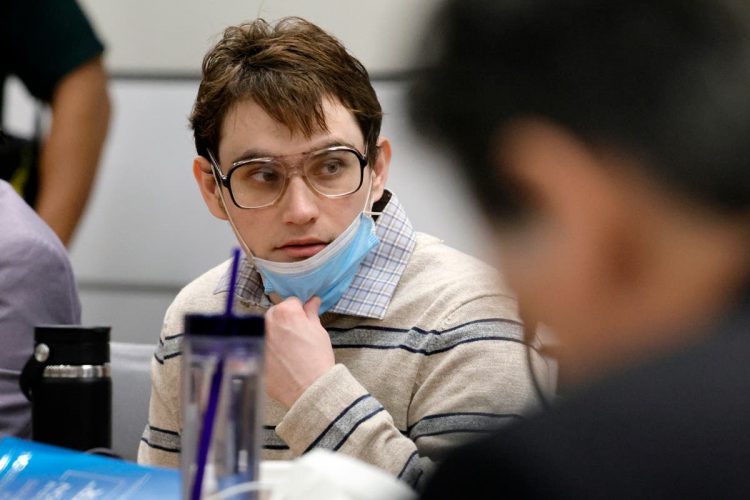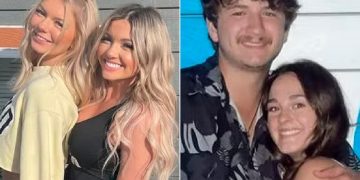Parkland school shooter Nikolas Cruz has avoided the death penalty after a jury ruled he should be sentenced to life in prison without the possibility of parole.
The verdict was delivered on Thursday morning to an emotionally-charged courtroom packed with survivors and families of the 17 students and staff killed in the shooting at Marjory Stoneman Douglas High School on 14 February 2018.
Family members appeared stunned and shook their heads as the 17-count verdict was read out by Judge Elizabeth Scherer.
The jury found that “especially heinous” aggravating factors necessary to reach a verdict of death had been proven during the trial, but at least one juror found they were not outweighed by mitigating circumstances.
The 12-person panel had to be unanimous to reach a death penalty verdict. After the sentencing, it was claimed that only one juror voted against the death penalty.
Cruz, 24, pled guilty in October last year to murdering 14 students and three staff members and wounding 17 others.
During a three month trial, the state described how Cruz planned his attack – researching other mass shooters online, making extensive preparations for his attack and recording a video where he outlined his plans.
His defence attorney Melisa McNeill and her team have never disputed that Cruz committed the shooting, but blamed his birth mother’s excessive drinking during pregnancy left him with foetal alcohol spectrum disorder.
Marjory Stoneman Douglas High School shooter Nikolas Cruz in court on 11 October during closing arguments
(AP)
It has been more than four years since Cruz, then 19, travelled to Marjory Stoneman Douglas High School on Valentine’s Day 2018 armed with an AR-15. He stalked the freshman building, murdering 14 students and three staff members.
In October 2021, Cruz pleaded guilty to 17 counts of murder and 17 counts of attempted murder.
In the state’s closing argument, prosecutor Mike Satz outlined in gut-wrenching detail the extent of planning Cruz put into carrying out the school shooting and walked jurors through the graphic moments of the attack – including how he shot and killed some terrified victims at point blank range.
“The testimony revealed the unspeakable, horrific brutality and the unrelentless cruelty that the defendant performed in the 1200 building on February 14 2018,” he said.
The prosecutor walked jurors through Cruz’s extensive preparations in the lead-up to the massacre, describing the plans as “goal directed”, “calculated” and “purposeful”.
A family member of a victim reacts at the verdict readout for Parkland school shooter Nikolas Cruz
(Screenshot / YouTube / Law & Crime)
Mr Satz said that Cruz’s online statements are a “window to his soul” and urged jurors to review his YouTube comments and internet history where he spoke of his desire to kill as many people as he could.
“It has been said that what one writes and what one says is a window into someone’s soul and some of the remarks the defendant wrote on his YouTube were: ‘no mercy, no questions, double tap’, ‘I’m going to kill a s*** ton of people and murder children’,” he said. “And on July 4 2017, ‘I love to see the families suffer.’”
He told jurors that “every YouTube comment, every search, everything that’s in evidence you can review when you deliberate”, saying that “what one writes and what one says is a window into someone’s soul”.
Mr Satz said that Cruz’s comments and plans online were what he “wanted to do” and “what he did do”.
Judge Elizabeth Scherer will ultimately decide whether to sentence Cruz to death
(South Florida Sun Sentinel)
“What he wanted to do, what his plan was and what he did was to murder children at school and their caretakers,” he said. “That’s what he wanted to do, that’s what he planned to do and that’s what he did.
In the defence’s closing argument, Cruz’s attorney Melisa McNeill pleaded with jurors to show the mass shooter “mercy” by sparing his life when they deliver their verdict.
Ms McNeill tried to appeal to the jury’s “moral compass” on Tuesday, reminding them that each of them has an “individual” decision to make about whether he lives or dies.
“You have to live with your decision for the rest of your life,” she said. “It’s your individual moral decision.”
When they “wake up in the night” after the trial is over, she told they won’t be with their fellow jurors but they will be alone with “your heart, your moral compass”.
Ms McNeill said that killing Cruz will “change absolutely nothing” and will not bring back the 14 students and three educators that he murdered in one of the worst mass shootings in US history.
Jurors deliberated for roughly seven and a half hours before returning the verdict on Thursday.
Cruz sat silent and emotionless as each count was read out, while family members of the victims seated in the gallery hid their heads in their hands in apparent disbelief.
Several families expressed their shock and outrage at a press conference after the court adjourned.
Lori Alhadeff, the mother of victim Alyssa Alhadeff, said she was “beyond disappointed”.
“This should have been the death penalty, 1,000 per cent,” she said.
Standing next to his wife, father Ilan Alhadeff asked jurors: “What were you thinking? Jail is about rehabbing soneone. There is no rehabbing [with Cruz].
“I pray that animal suffers every day of his life in jail. And it should be a short life.
“What a load of hogwash. There were no mitigating circumstances. He’s not a human being. He’s an animal.”
The families expressed how the verdict erased their faith in the justice system.
“It’s pretty unreal that nobody paid attention to the facts of this case, that nobody can remember who a victim is and what they look like,” Tony Mantalto, whose daughter Gina was killed in the shooting, told reporters.
“Our justice system should have been used to punish this shooter to the fullest extent of the law, not as an act of revenge, but to protect our nation’s schools to stop others from attacking the future of this country when they attack our schools,” he said.
Fred Guttenberg, who lost his daughter Jaime in the shooting, said: “I’m stunned. I’m devastated. There are 17 victims that did not receive justice today.
“This jury failed our families today.”
Ryan Petty, whose daughter Alaina was killed in the massacre, told reporters he’d learned only a single juror decided against the death penalty.
“As I was walking up here, I was informed that the vote was 11 to one,” Mr Petty said of the jury’s decision. “One juror. One juror either didn’t understand the facts in this case or was dishonest with themselves when they signed up to become a juror and would never have voted for the death penalty.”
“You cannot look at the facts of this case, look at the cruel and inhumane way the 17 victims were treated…” he continued before diverting to the horror details presented in court.
Mr Petty thanked prosecutors for doing a “perfect job” on the case, saying: “Each of those jurors understood the facts that were presented and the aggravators.
“Yet somehow, one of them thought that the mitigators presented by the defence” outweighed those aggravating factors.
He said he understood the duty borne by the defence, but said: “The lack of empathy shown by the defence to these families – it’s indefensible.”
Source by www.independent.co.uk





























